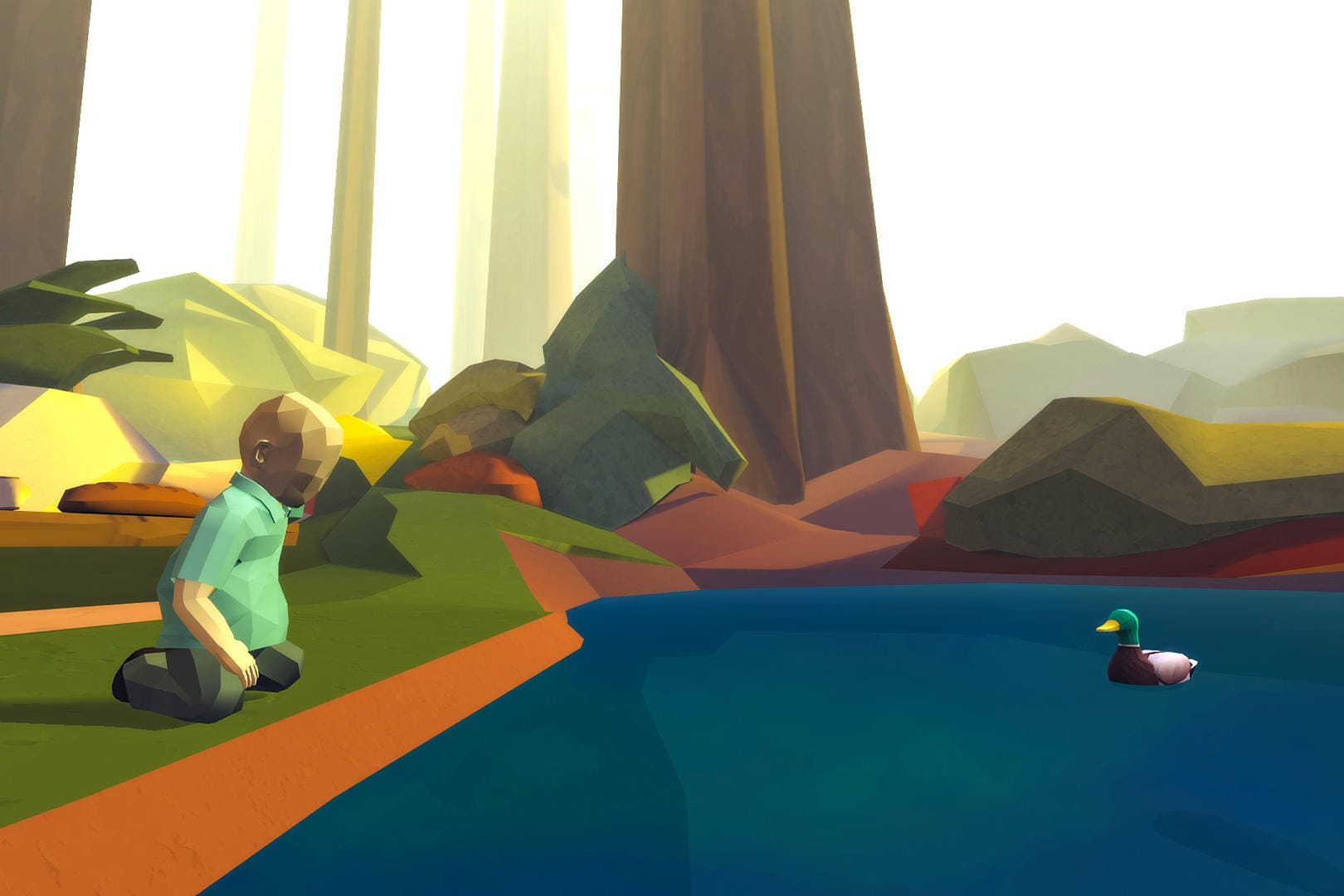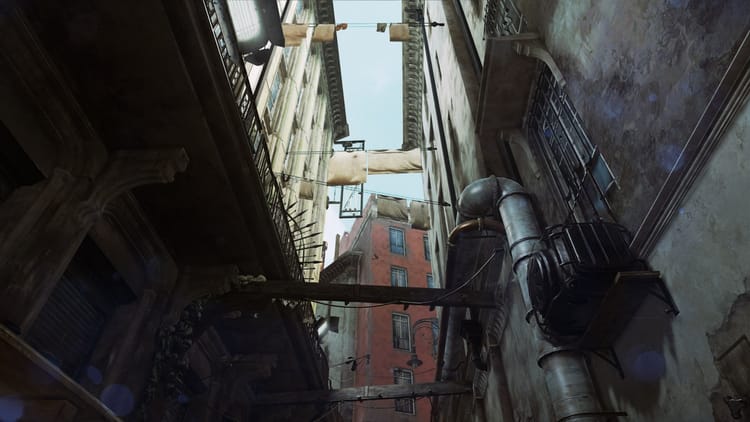Have a little more faith in That Dragon, Cancer

The most interesting part of the discussion surrounding this year’s That Dragon, Cancer is the reaction on the part of its audience to its religious element. The Telegraph’s review, for example, expressed puzzlement at the faith itself, but not at faith as a coping mechanism. Kill Screen’s own review discussed the way in which elements of that belief were incomprehensible to those who do not buy into the essential premise. A common theme in these reviews is that grief is eminently relatable; while faith, or at least the specific permutation found in the game, is considered potentially alienating.
These same reviews only make mention of religion in the latter part of the game, when it is at its most obvious. The truth is it was always there, informing and supporting the narrative, just as it informed the real-life events that led to the game’s creation. For example, the fact that the game’s protagonists and creators, Ryan and Amy Green, named their son Joel, in the context of their belief, reflects that faith as Joel is an anglicized version of the Hebrew Yoh’el, meaning, “the Lord is God.” At the same time, it is just as valid a sign of how religion pervades the game. The videogame is, in essence, suffused in a Christian context that, like an iceberg, is only noticeable at its most dramatic and obvious points.
Grief is eminently relatable; while faith is considered potentially alienating
One of these obvious points is the presence of Grace. In Christian theology, Grace is a complicated concept, but it essentially captures a variety of tangible and intangible gifts given by God, running the scale from good health (natural grace) to salvation (sanctifying grace). The term has a history, but the short of it is this: Grace is given by God to help mankind. And in That Dragon, Cancer, the most transparent invocation of Grace comes in the two-dimensional mini-game that casts Joel’s struggle as a religious one. This mini-game is, perhaps, the more conventional experience the description “a video game about a child dying of cancer” calls to mind. Yet it serves as a microcosm of the whole experience, as the point is to lose and to experience that loss in depth. The religious element has the same experiential texture: upon reaching a jump Joel cannot make, Grace in the form of an eagle—as with Dante in Purgatory—lifts him up to a place he cannot reach on his own. But this is not the sole moment of Grace within the game. It reappears in the penultimate scene’s end, when the camera pans downward and reveals that the player, and Joel, have been resting on an aquiline mosaic the whole time—they have been literally supported by Grace.
Avian references are found throughout the entire game. The opening scene has the player control a duck, while there is a long stretch of the game that is witnessed by a player-controlled seagull. Granted, there are no doves—a common symbol of the Holy Spirit, the third part of the Christian Trinity. Nor are there pelicans, another symbol for Christ stemming from the medieval belief that it fed its young with its own blood. Still, there is a history of associating varying elements of Christian belief with avian symbols: why not, then, add a few new ones? The ducks at the local pond are an extension of God’s gift—the mundane presence of God—in the same vein as the tutelary, household deities of old. Viewed as a strict allegory, the duck controlled at the start of the game implies that the player—with their curated omniscience—is placed in the role of God, or at least operates from His perspective. In a similar vein, the player later kindles tongues of flame in a cathedral’s pews, a moment alluding to Acts 2:3 where the Holy Spirit comes and gives the faithful wisdom. This role is also hinted in how the player rarely has direct control over Ryan through a one-to-one correspondence between keyboard and avatar. Save for the Mario Kart and Super Mario mini-games, the player clicks the object that Ryan is to interact with. In essence, the player does not directly control, she merely guides.

God games have gone out of style of late. It has been just over 10 years since the Peter Molyneux directed Black & White 2 (2005), while Godus is only his and the genre’s latest failed iteration. But it is worth noting the contrast between That Dragon, Cancer and Molyneux’s productions. The latter emphasize sheer power, defining omnipotence as the literal ability to move mountains or rain fire from the sky. While That Dragon, Cancer is quieter, more subdued, and perhaps represents a more familiar understanding of faith to the faithful. For the player is not omnipotent, merely omniscient. She is a witness to grief, sorrow, and joy, watching and guiding Ryan and Amy through their trials. The player acts as God, and in doing so perhaps finds an understanding of what belief means to so many believers: a sense of presence, of company, of a witness.
Granted, this is not the sole perspective in That Dragon, Cancer, as when the camera pans into Ryan’s or Amy’s head, it is clear that the perspective is theirs. But the activity on the part of the player does not change: guidance and witnessing. However, the player’s curated omniscience involves hearing the thoughts of Ryan and Amy, an intimacy that returns nothing, a silence that marks only presence. Indeed, all of the allusions to the Bible in the game invoke this idea of silence as presence of the divine. For example, the story of Christ calming the seas is from Mark 4:35-41, and ends with the command for “peace, be still.” The quotation from 1 Kings cited by Ryan similarly carries with it the idea that God is found in these quiet, unglamorous moments:
And, behold, the Lord passed by, and a great and strong wind rent the mountains, and brake in pieces the rocks before the Lord; but the Lord was not in the wind: and after the wind an earthquake; but the Lord was not in the earthquake: and after the earthquake a fire; but the Lord was not in the fire: and after the fire a still small voice.

To return to Christ calming the storm, the part of this story that Ryan does not mention is Christ’s questioning of his disciples’ faith: “and he said unto them, Why are ye so fearful? how is it that ye have no faith?” This lack of doubt is one of the more pressing unaddressed questions. Indeed, if there is any event that gives rise to doubt in God’s goodness, it is the death of a child, with all its concomitant suffering and His alleged consent to that agony. Job, the iconic character from the Old Testament who represents patience in the face of suffering, is a parallel example: Job is a righteous man, but nevertheless has his property and family destroyed in a series of disasters. He cannot understand the reasons behind this utter reversal of fortune, but when his wife urges him to curse God and die in his misery, Job refuses to blaspheme. Both examples of faithfulness—that of Job and That Dragon, Cancer—are ostensibly incomprehensible responses to moments of high injustice, and yet they nevertheless demand some kind of understanding.
Christian apologist C. S. Lewis offers something of an answer to this question of doubt in a book he wrote after the death of his wife, A Grief Observed (1961). The work is more meditative than his other polemics, being as it is a collection of haphazard thoughts written at varying points while he was grieving, arranged afterwards into a coherent—though meandering—thread on his faith, his relationship with his wife, and the presumptions he had regarding both. “If my house has collapsed at one blow, that is because it was a house of cards,” Lewis wrote. “The faith which ‘took these things into account’”—that is, took death into account—“was not faith but imagination.” If a thing like faith fails when it was first tested, perhaps it was never strong to begin with. There are jokes about atheists in foxholes, but the truth may be that there are few believers in foxholes as well. Doubt, then, does not necessarily enter the picture; they are beyond it.
An intimacy that returns nothing, a silence that marks only presence
The appropriate question for That Dragon, Cancer then is not “do you doubt?” but “how can I understand this sorrow?” To ask whether faith is something to be questioned and thrown away, depending on the context, indicates an assumption of an ancillary or extraneous quality inherent to that faith, a jacket to be put on and removed when appropriate. But in That Dragon, Cancer, it is—like the eagle mosaic—the very ground upon which they walk, the only lens through which they can comprehend their suffering. To return to the analogy of the player and God, her presence is not to be existentially questioned; the fact of her presence is only to be understood. Not, “does God exist,” but “how does He operate in this moment?” The game’s answer is to present the player as neither the subject nor the object of the videogame—neither Ryan nor Joel—but merely as a witness.
Yet there is always the ultimate failure of understanding, which has been incorporated into Christian apologetics. The answer to Job’s question—after his ‘friends’ assert that he must have done something wrong (according to the logic of retributive justice) to deserve the suffering he now experiences—represents some of the more striking poetry of the Old Testament. God speaks out of the whirlwind and asks “Where wast thou when I laid the foundations of the earth? Declare, if thou hast understanding. Who hath laid the measures thereof, if thou knowest?” Put simply, God’s answer is that mankind is inadequate to the task of understanding what order there is in the world. Again, Lewis offers a useful reading of the implication of this essential inability to understand the essential order, or justness, of the world in the context of God’s alleged goodness: “What do people mean when they say, ‘I am not afraid of God because I know He is good’? Have they never even been to a dentist?”

But the player does not speak out of the whirlwind, and neither Ryan nor Amy ask why. The question of God’s presence is phrased differently, in terms of how He will act in this story. Amy is convinced that a miracle awaits Joel; Ryan is less sure. The prayer meeting (which strikes an ex-Catholic like me as, well, indecorous) provides something of an answer: the player, pressing the keys, kindles the flames of wisdom in the devout. God is not absent in this scene, but neither does the player’s performance match the hopes and expectations of the game’s characters. The player inspires—dispensing wisdom, if we hold closely the reference to Acts noted above—and bears witness. In essence, the player’s actions are in keeping with the expectation of the faithful, giving a subtle understanding of the texture of religious faith.
This idea of unarguable presence and contemplation is not the only flavor of faith, of course. But the player nevertheless moves easily into this role as a witness, regardless of her own particular theological stance, learning of Ryan’s and Amy’s belief, along with their hopes, their fears, and the particular nature of their struggle. This presence is a part of playing as god. It fulfills the promise of Paul in 1 Corinthians: “Now I know in part; but then shall I know even as also I am known.” The latter part of this quote—of being known—is a corollary of omniscience: it bears with it the promise that despite the awkward miscommunications and the frustrated meant-to-says inherent to our life, there will, at last, be some kind of true recognition of who we really are. It is this promise of understanding that the game, through the eye of the player, fulfills as well as it can. The idea of knowing Joel, with his limited vocabulary and his love for dogs and pancakes, and knowing Ryan and Amy in their grief and faith is the point of this small, quiet God Game. There is no whirlwind for the player to leap from; there is only the silent comfort of sympathy, of the assurance of a sympathetic witness, of the promise of understanding. It is an experience that reflects the texture of belief.
Photo: Ludolf Backhuysen – Christ in the Storm on the Sea of Galilee, Wikimedia Commons, Public Domain



